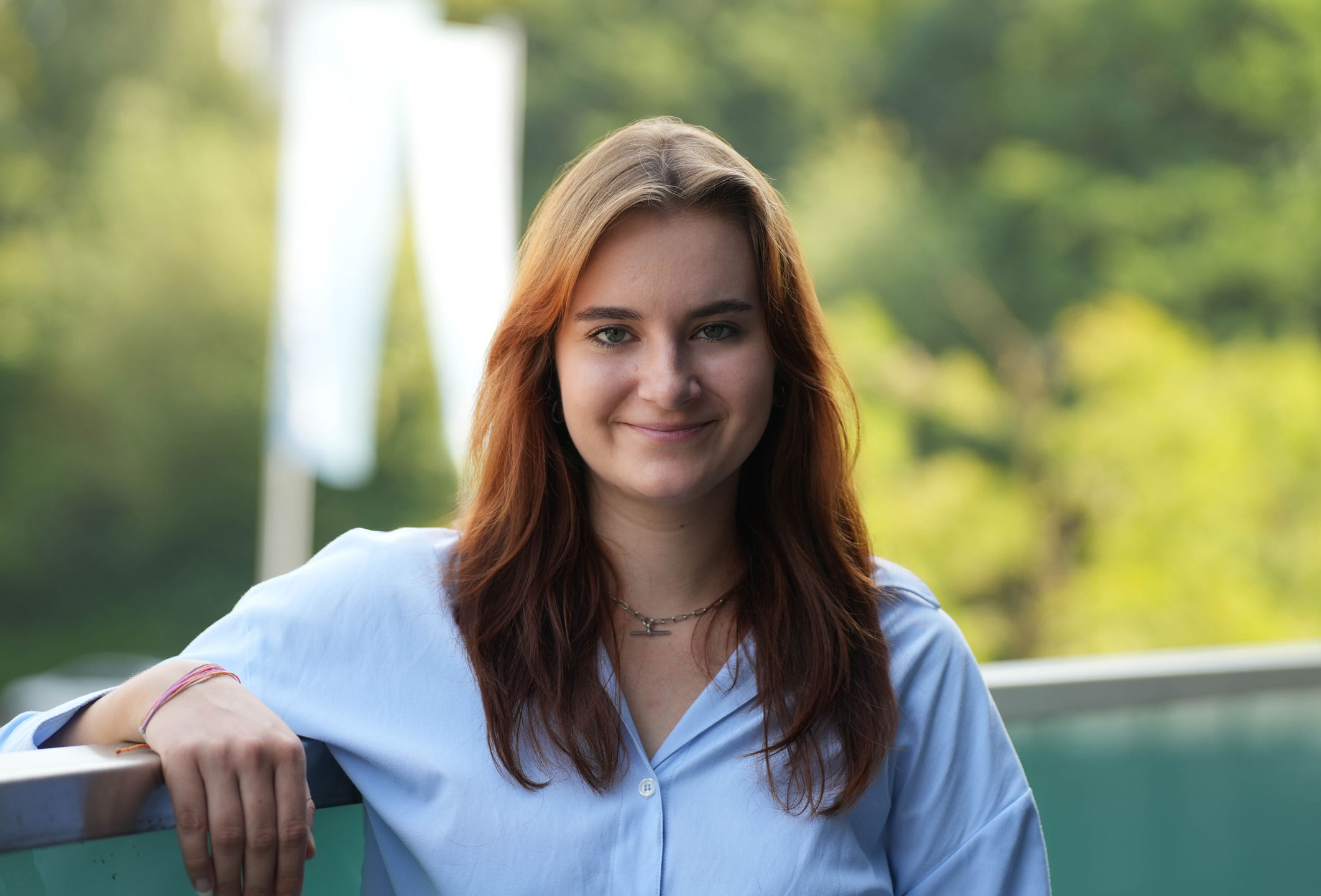Von Kalifornien nach Paderborn: RISE-Praktikantin am Fraunhofer IEM
Alexandra Fomina studiert Software-Engineering und Mathematik an der Chapman University in Orange County, Kalifornien. Von Anfang Juni bis Ende August 2025 absolvierte sie im Rahmen des akademischen Austauschprogramms RISE Germany ein Forschungspraktikum am Fraunhofer IEM. In dieser Zeit setzte sie sich intensiv mit dem Thema Softwaresicherheit auseinander und gewann spannende Einblicke in den Forschungsalltag am Institut. In einem kurzen Interview erzählt sie von ihren Erfahrungen und den Eindrücken, die sie aus Paderborn mitnimmt.

Can you tell us a little bit about yourself and your academic background?
Alexandra: My name is Alexandra Fomina, and I’m in my final year at Chapman University in Orange County, California. I’m studying Software Engineering and Mathematics, with a focus on machine learning and statistics.
Why did you choose to apply to Fraunhofer IEM?
Alexandra: I chose to apply to Fraunhofer IEM for several reasons: the description and goals of the project, as well as the location. Based on my previous research and academic experience, I knew I wanted to spend the summer doing work related to machine learning, AI, and large language models. However, I didn’t have prior experience with software security. I’ve also never had the opportunity to work at a research institute, so I was excited about that aspect as well. Personally, I felt that Paderborn would be a good fit for me. I grew up in a small university town, so I thought living here would feel familiar, despite being in a foreign country.
What projects or tasks are you working on during your internship?
Alexandra: Over the last two months, I’ve primarily worked on building an IntelliJ plugin that uses large language models to explain software security issues to software developers. Although I’ve had prior experience coding and building projects in Java, this was my first time building an entire plugin from scratch. On top of that, I’ve never explored software security academically, so I’ve definitely learned a lot about security during my internship. Not only did I learn how to structure large-scale projects, but I also picked up a new programming language, Kotlin. Working in a fast-paced research environment with multiple developers was another first for me. Coming out of this experience, I feel confident in my ability to work both independently and as part of a team. Additionally, I am confident that I can work on any project, regardless of whether or not I have prior experience or background knowledge in the subject.
How do work and research in Germany compare to your experiences in your home country?
Alexandra: When I first started working at Fraunhofer IEM, I experienced a huge culture shock. In the US, research and work are primarily focused on deliverables and meeting deadlines, without much regard for an individual’s work-life balance. In Germany, while meeting deadlines and moving forward in your work is still important, there is also a strong emphasis on well-being and personal development. I also didn’t realize how close-knit workplaces were: every day, everyone in the office eats lunch together, and no one is left out. Additionally, I find the tradition of taking a short walk after lunch a welcome change of pace to the monotony of sitting behind a desk for eight hours straight.
What do you enjoy most about living and working in Paderborn or Germany in general?
Alexandra: I love living in Paderborn! It is such a unique experience to wake up each morning and walk past buildings that have stood the course of hundreds of years. I grew up in a small university town, so Paderborn felt familiar to my childhood. The greenery and wildlife are particularly appeasing to me, especially the abundance of walking and biking trails. The Libori festival was another highlight – it was interesting to see just how lively Paderborn can get. I would have loved to see the Christmas market as well, and I wish I had more time to see how life in Paderborn changes across the seasons.
How has this internship influenced your perspective on your future path – whether in your studies or your career? Can you imagine pursuing further studies, such as a Master’s or PhD, in Germany or even in Paderborn?
Alexandra: Absolutely! I’ve always wanted to study or work abroad, and this internship has allowed me to submerge myself in an unfamiliar work culture and showed me that I can thrive in such an environment. I’m heavily considering applying for further DAAD scholarships to fund continued research or a Master’s program in Germany, as well as other international programs in Europe. I really like the structure of graduate studies in Germany, especially the opportunity to write a thesis during a Master’s program, which isn’t typically an option in the United States. Currently, I think the biggest barrier for me right now is not being fluent in German, but I plan to address that by taking German language courses in the near future.
Is there anything else you would like to share about your time in Paderborn or your internship at Fraunhofer IEM?
Alexandra: While any opportunity to move abroad as a student is good for personal growth, I believe that an internship abroad can truly open your eyes on the many opportunities and paths life has to offer. Working abroad and experiencing different approaches to work-life balance has been invaluable to me. Although it can be daunting at first, I would encourage everyone to experience life abroad at least once.
Das Programm RISE Germany (Research Internships in Science and Engineering) ermöglicht Studierenden aus Nordamerika, Großbritannien und Irland die Teilnahme an Forschungspraktika in Deutschland. Während ihres Aufenthalts arbeiten die Studierenden eng mit Doktorand:innen an Universitäten oder Forschungsinstituten zusammen, unterstützen diese bei Forschungsprojekten und profitieren dabei von einer fachlichen sowie persönlichen Betreuung. Der Deutsche Akademische Austauschdienst (DAAD) fördert die Praktikant:innen mit einem Stipendium.
 Fraunhofer-Institut für
Fraunhofer-Institut für